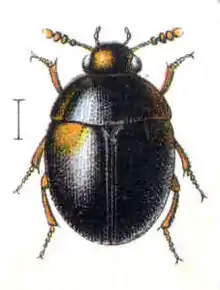Leiodidae
Leiodidae is a family of beetles with around 3800 described species found worldwide. Members of this family are commonly called round fungus beetles due to the globular shape of many species, although some are more elongated in shape. They are generally small or very small beetles (less than 10 mm in length) and many (but not all) species have clubbed antennae.
| Leiodidae | |
|---|---|
 | |
| Anisotoma humeralis | |
| Scientific classification | |
| Kingdom: | Animalia |
| Phylum: | Arthropoda |
| Class: | Insecta |
| Order: | Coleoptera |
| Suborder: | Polyphaga |
| Infraorder: | Staphyliniformia |
| Superfamily: | Staphylinoidea |
| Family: | Leiodidae Fleming, 1821 |
| Subfamilies[1] | |
| |
| Diversity | |
| at least 380 genera | |
Adults and larvae of these beetles generally feed on fungi in rotting plant or animal material. Some species are common in birds' nests and mammal dens.
See also
References
- Bouchard, Patrice; Bousquet, Yves; Davies, Anthony E.; Alonso-Zarazaga, Miguel A.; et al. (2011). "Family-group names in Coleoptera (Insecta)". ZooKeys (88): 1–972. doi:10.3897/zookeys.88.807. ISSN 1313-2989. PMC 3088472. PMID 21594053.
This article is issued from Wikipedia. The text is licensed under Creative Commons - Attribution - Sharealike. Additional terms may apply for the media files.